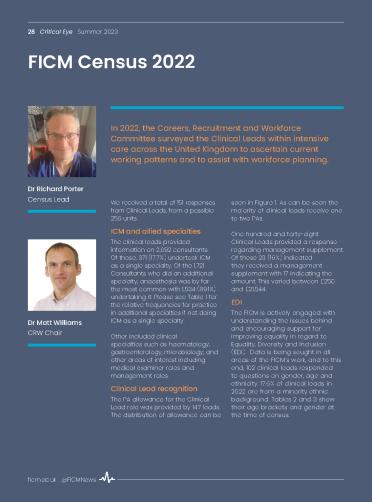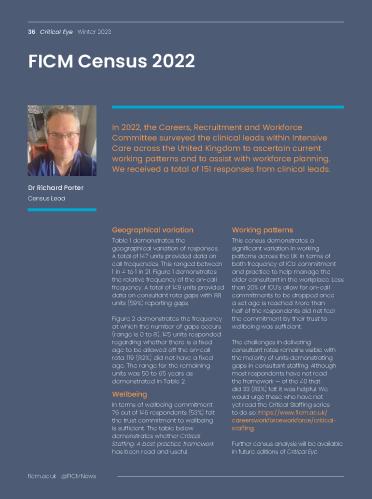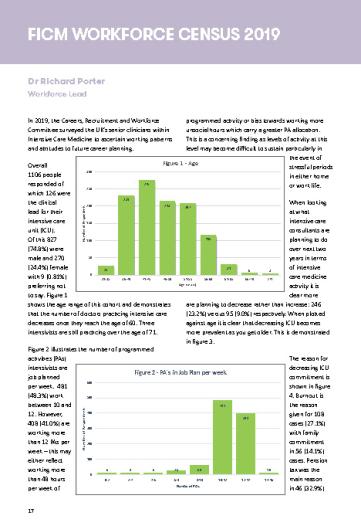Census
2024 Census Information
It is essential for Intensive Care Medicine (ICM) to have constant up to date information on the specialty’s workforce. The faculty, through its Careers, Recruitment and Workforce (CRW) Committee, is tasked with taking forward conversations with national stakeholders and deaneries to protect growth in the specialty and can only do this with information from you. We need to be able to have reliable and detailed information on the specialty annually to help us develop our strategy for ensuring there is a well-trained and supported clinical workforce that can provide a high-quality service to our patients wherever and whenever it is required.
The request to complete the 2024 census has been sent to all FICM members registered with us as ICM Consultants, ICM Specialist Doctors, Intensivists in Training, Clinical Fellows, Locally Employed Doctors, Associate Specialist and Specialty Doctors to provide us with information for these workforce groups.
Email invitations to complete the census will be sent out w/c 7 October 2024.
The deadline to submit data for the Census will be 5pm on Monday 11 November 2024
Key facts about the 2024 Census
- The survey is aimed at various groups within the Intensive Care Workforce and as such your journey through the survey will differ (depending on your role) to ensure the questions are relevant.
- The census opens with an optional section containing Equality, Diversity and Inclusion questions. Whilst you do not have to answer these questions the data it would provide will assist the Faculty to better understand and serve our diverse ICM workforce.
- The census should take less than 10 minutes to complete.
Thank you in advance for completing the survey.
The information it provides is vital to the Faculty’s work moving forward.
Data collection
We would encourage all ICM consultants to assist the Faculty in every way they can to ensure this simple and short survey is completed during its annual collection phase (usually March to June).
It is essential the Faculty receives a high responses rate so that we can build a robust dataset upon which to base projections. The results of this exercise will be employed by the Faculty to:
- Illustrate to external bodies the need for our skillset and services within and beyond the ICU, both now and in the future healthcare environment.
- Facilitate workforce planning. The Faculty is already fully engaged with the Centre for Workforce Intelligence, that has been charged by the DoH to undertake a ‘deep dive’ on the need for consultants in intensive care medicine now and out to the mid 2030s. This exercise can be effective only when informed by the information we now seek from the Fellowship.
- Inform our discussions with Health Education England concerning the numbers of trainees needed for our specialty, and the manner in which they should be recruited, now and over the next decade.
- Enable us to respond to the Shape of Training Review which has made strong recommendations, likely to be adopted by central government, regarding the skillset and competencies needed by the future consultant/trained medical workforce.
2022 Census - 10 Key Points
- 151 responses received from the 264 Clinical Leads contacted
- Of the 101 respondents to this question - 32 (32%) Clinical Leads identified as female, and 83 (82%) as white ethnic origin
- Out of 2092 consultants, 371 (17.7%) clinical practice is for ICU as a single specialty
- 1534 of the 1721 (89.1%) who practiced more than one specialty undertook anaesthesia as a second specialty
- 77% of Clinical Leads received 1 to 2 PA’s for this role
- Duty consultant On-call frequency was between 1 in 4 to 1 in 24. Most common frequency: 1 in 8
- Consultant vacancies (rota gaps) were present in 88 (59%) of responding units – reporting 1 to 8 gaps.
- No set age to come off the rota was noted in 119 of the units (82%)
- FICM’s Critical Staffing document series was considered useful by 33 of the respondents (26%) – with further 65 (51%) were planning on reading the articles
- Improving staffing levels was seen as the most significant intervention that could positively address wellbeing by 65 (59%) of the 110 respondents to this question
Past Census Overviews
Workforce in Intensive Care Medicine
Recruitment to Retirement - A Census update for Fellows and Members
FICM Workforce Advisory Group Position Statement
The Workforce Advisory Group has published a position paper based on the 2014 Workforce Census and the information collected for the CfWI report. The paper:
- Describes the current physical and human resources available for the delivery for the intensive care to patients in England and Wales
- Attempts to predict future demand for the clinical service and records the best estimates that can be made of the current and future composition (up to 2035) of the medical workforce
- Makes recommendations as how to how this data should be employed.
The position paper and accompanying covering letter can be read below:



